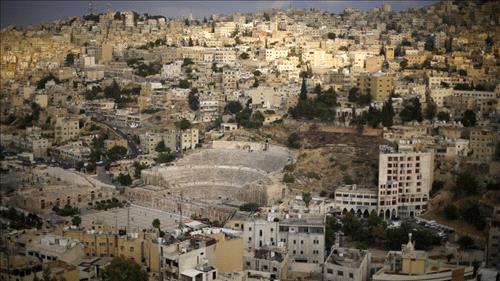Ammon News - AMMONNEWS - This is a tale of two cities — the Jordanian version — and it is surreal in many aspects. It started on Oct. 21, when Prime Minister Hani al-Mulki revealed in a meeting with local media that his government had finished a comprehensive study to build a “new Amman.” He said the new city would not be connected to the capital. The announcement shocked Jordanians, who were taken by surprise. The idea had never been proposed by previous governments or publicly discussed.
Almost a week later, on Oct. 29, Mulki announced that the new city was part of the government's effort to stimulate the economy and attract investment, especially from the private sector, and that it would be built entirely on government land. The project, he claimed, would help ease traffic congestion in the capital and contribute to solving the challenges of overcrowding.
Still, Jordanians were perplexed. Was this new city to become Jordan’s new capital? Why did Mulki call it a “new Amman”? Most important, where would the cash-strapped government find the money to finance such a mega project?
Under pressure from the public and media, government spokesman Mohammad al-Momani made things worse while speaking to a local TV station. On Oct. 28, Saraya news reported him as saying that “no one knows where new Amman will be located except for four or five persons.” The outlet also noted, “He himself doesn’t know.” Momani did say, however, that the “new capital” has been under study for the last six months, and it will be constructed in partnership with the private sector “since the state budget will not be sufficient.” He revealed that it is to be carried out over five phases.
Meanwhile, no one from the private sector has stepped forward to confirm the project ever being discussed. The public began playing a guessing game on social media platforms about the secret location of the new city. Most have rejected outright the notion of moving the capital from Amman.
Feeling the need to end the controversy, the government on Nov. 5 unveiled maps and additional details about the “new city,” describing the project as a significant step aimed at providing a better lifestyle for residents, improving services and offering low-cost housing. A government statement said the nameless city will accommodate the accelerating urban expansion of Amman and Zarqa, among other cities, and provide convenient alternatives in terms of the quality of housing as well as alleviate current urban pressures, including overcrowding.
It added that the new city will be smart and sustainable, equipped with adequate infrastructure and adaptable to long-term urban planning, leaving the door open to future development. The project will involve cooperation between the public and private sectors under a build-operate-transfer formula with financing secured from local, regional and international financial institutions and banks. According to maps, the city will lie 30 kilometers east of Amman and Zarqa on government land with phase one kicking off in mid-2018. That phase will be completed by 2030, and the entire project will be concluded by 2050.
The government has refrained from calling the city New Amman, but the public has not stopped asking for more details. The mayor of Amman, Yousuf al-Shawarbeh, has emphasized that no new city will ever replace Amman as the capital. He told members of the city council on Nov. 6 that the proposed city is one part of a long-term government plan to meet the needs of future generations. He said that Amman’s population, currently 4 million people on 1,680 square kilometers, is growing at a rate of 2.4% annually. The government expects the combined population of Amman and Zarqa, 10 kilometers east of Amman, to reach 10 million by 2050.
Economist Jawad al-Anani, a former deputy prime minister, is a fan of the project. He told Al-Monitor that Jordan must plan if it is to overcome the problems of overcrowding and traffic congestion that Amman suffers from today.
“Diverting population pressure from the capital to the governorates will improve public services and jobs, allowing for a better distribution of wealth,” he said. “We have an opportunity to build a smart and clean city with proper planning, modern public transportation system, and that is also dependent on clean energy.”
The location of the new city is ideal, Anani believes, since it will be close to natural resources, including water, and not far from the Iraqi border and Jordan’s only seaport, Aqaba.
Political analyst Amer al-Sabayleh told Al-Monitor that the government’s assertions remain unconvincing. “We have to look at the larger picture and try to put this project into perspective, in light of the American plan to impose a grand regional settlement [of the Palestinian-Israeli conflict],” he said. “This project could be part of the so-called economic peace in the region.” He warned that such a huge project could end up draining state resources.
Some economists agree with Sabayleh's thinking. Economic analyst and columnist Fahed al-Fanek wrote in the daily Al-Rai Nov. 3 that the plan is no more than a real estate venture where the government will end up paying rent to the private sector. He also warned that the private sector, which has apparently not been consulted, already owes hundreds of millions of dinars to local banks and will be unable to finance such a huge undertaking. The project will deny the private sector needed funds to participate in the reconstruction of Syria and Iraq while damaging the service-dependent economy of Amman as a capital city.
For many Jordanians, New Amman is more of a white elephant project designed to deflect attention from the current economic crisis and the tough and unpopular decisions the government is expected to approve before the end of this year. At the top of the list is ending bread subsidies, a sensitive issue likely to result in public outcry and protests.
*Al-monitor








 comment replay
comment replay 